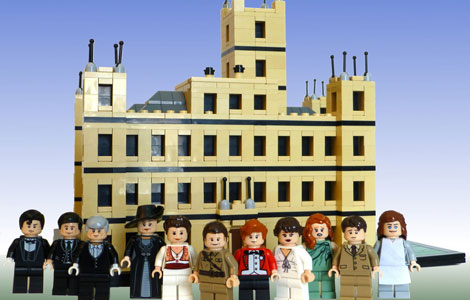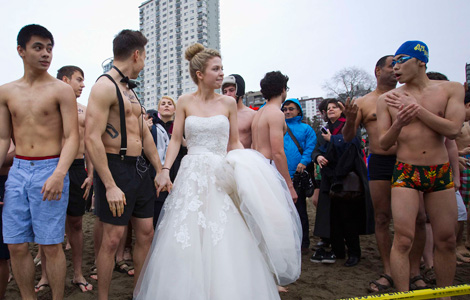Abe's actions an inauspicious start to year
Updated: 2014-01-03 08:18
By Chen Weihua (China Daily)
|
||||||||
 Japan's attitude toward its heinous World War II history has long caused tension with its two main neighbors, China and the Republic of Korea. And there has been no sign that Japanese Prime Minister Shinzo Abe intends to ease the tension in 2014; instead it looks like he intends to inflame it further.
Japan's attitude toward its heinous World War II history has long caused tension with its two main neighbors, China and the Republic of Korea. And there has been no sign that Japanese Prime Minister Shinzo Abe intends to ease the tension in 2014; instead it looks like he intends to inflame it further.
On the first anniversary of his premiership on Dec 26, Abe chose to visit the Yasukuni Shrine, where 14 notorious Class-A WWII war criminals are enshrined. It was the first such visit by a sitting Japanese prime minister in seven years.
Then on the New Year's Day, Japanese Internal Affairs and Communications Minister Yoshitaka Shindo paid, what was probably, his fourth visit to the shrine in the past year.
Abe and Shindo said that their visits were not to hurt the feelings of Chinese and Koreans and should not become a diplomatic issue. They even said the purpose of their visits was peace.
This shows how willing some Japanese political leaders are to run roughshod over the feelings of those who suffered from Japan's brutal militarist past: such as the "comfort women" in Korea, China and the Philippines, those abused by the Japanese Imperial Army Unit 731 in its biological experiments in Northeast China and the relatives of the 300,000 killed in the Nanjing Massacre, crimes that Abe and his right-wing cohorts have tried to either deny or whitewash over the years.
German political leaders are a stark contrast when it comes to WWII history. Chancellor Angel Merkel and her predecessors have never done anything to open old wounds. Instead, former German Chancellor Willy Brandt knelt on the wet ground in December 1970 at the monument to the Jewish ghetto victims in Warsaw, Poland.
No wonder Merkel's spokesman Steffen Seibert on Monday reminded Japan to "honestly live up" to its role in the horrible events of the 20th century. He said only on the basis of this honest accounting is it possible to build a future with former foes, a conviction Germany has taken to heart.
This is exactly where Japan's problem is. Some say that Japanese prime ministers have apologized repeatedly for WWII, so the past should no longer be an issue.
If that is true, then the question is why so many Chinese and Koreans still feel strongly that the Japanese apologies have never been sincere or accepted. It's not just because Japanese politicians often use half-hearted words, such as regret, when they should be condemning the atrocities, but also what Japan has done and is doing, such as revising the history of WWII in its textbooks.
The US government has so far said it was "disappointed" at Abe's visit. It should use much stronger words in denouncing Abe's acts and urge Japan to face up honestly to its past. After all, Abe's shrine visit came only 19 days after the 72nd anniversary of the attack on the Pearl Harbor, which drew the US into WWII.
Japan may be an ally of the US today, but during WWII, it was China that was the ally, as exemplified by General Claire Chennault's Flying Tigers, a group of American pilots who fought alongside Chinese against Japanese in China during WWII. So the US should not be hijacked in any sense by Abe while anxiously pursuing its rebalancing to Asia-Pacific strategy. This is a matter of principle, justice and conscience.
The year 2014 did not start well for anyone who hopes to see a thaw in relations between Japan and its two neighbors, China and the ROK. It never will if Japanese political leaders are unwilling to honestly and sincerely face up to the country's militarist past and stop humiliating the WWII victims in neighboring countries.
The author, based in Washington, is deputy editor of China Daily USA.
chenweihua@chinadailyusa.com

 The Lego version of Downton Abbey
The Lego version of Downton Abbey
 Police probe fire attack on Chinese consulate
Police probe fire attack on Chinese consulate
 Powerful storm brings Arctic cold, snow to US
Powerful storm brings Arctic cold, snow to US
 Beijing sees little improvement in air quality
Beijing sees little improvement in air quality
 125th Rose Parade celebrated in US
125th Rose Parade celebrated in US
 Cold doesn't dissuade 'Polar Bear Swimmers'
Cold doesn't dissuade 'Polar Bear Swimmers'
 First photos of Liaoning battle group made public
First photos of Liaoning battle group made public
 US First Family out for shave ice in Hawaii
US First Family out for shave ice in Hawaii
Most Viewed
Editor's Picks

|

|

|

|

|

|
Today's Top News
As Obamacare begins, critics launch new assault
FBI: Consulate fire not terrorist act
Smog may affect mental health
New joint command system 'on way'
Chinese helicopter saves 52
US citizens express little hope in govt
China protests US' prisoner transfer
Snowstorm pushes into US Northeast
US Weekly

|

|






